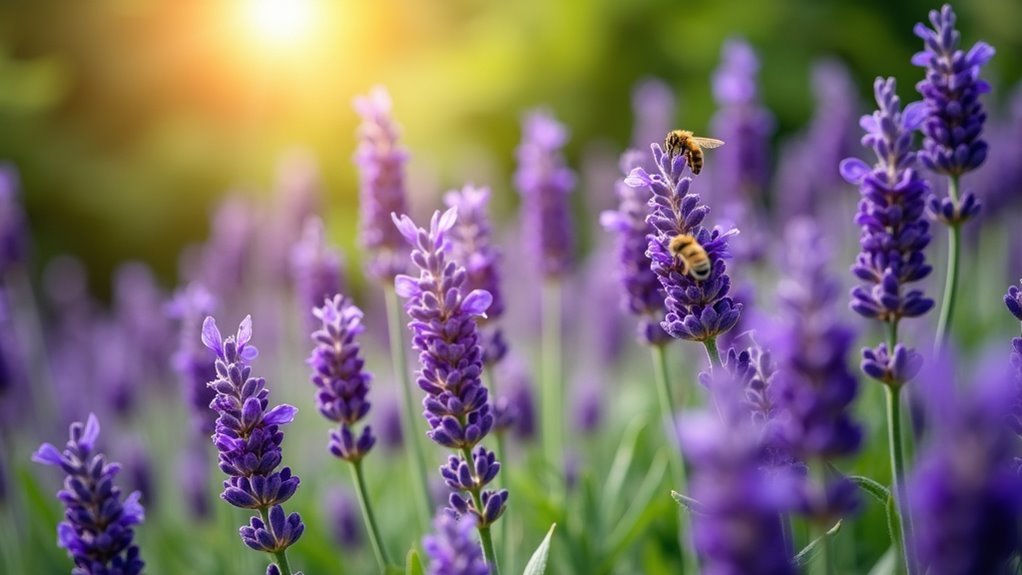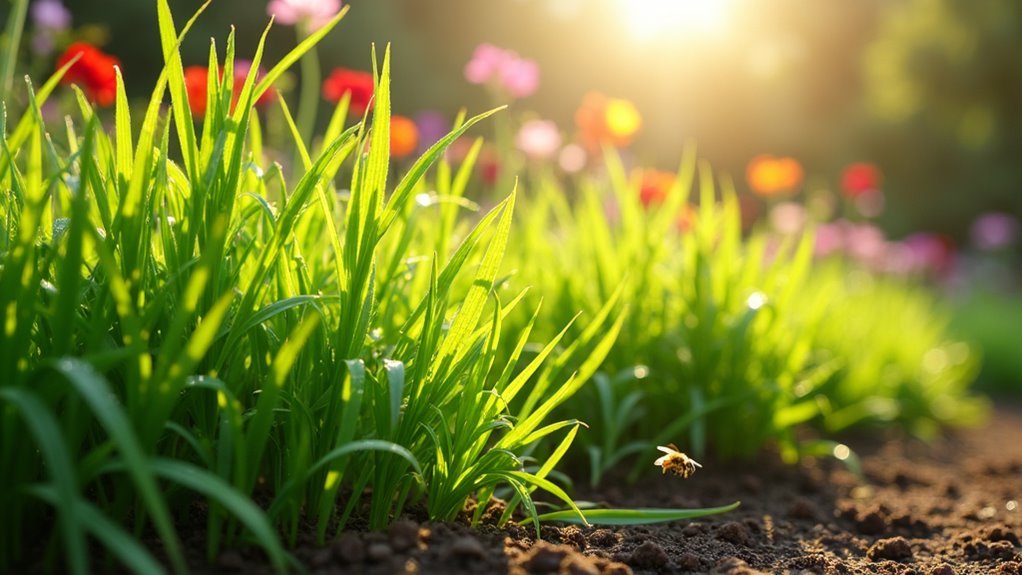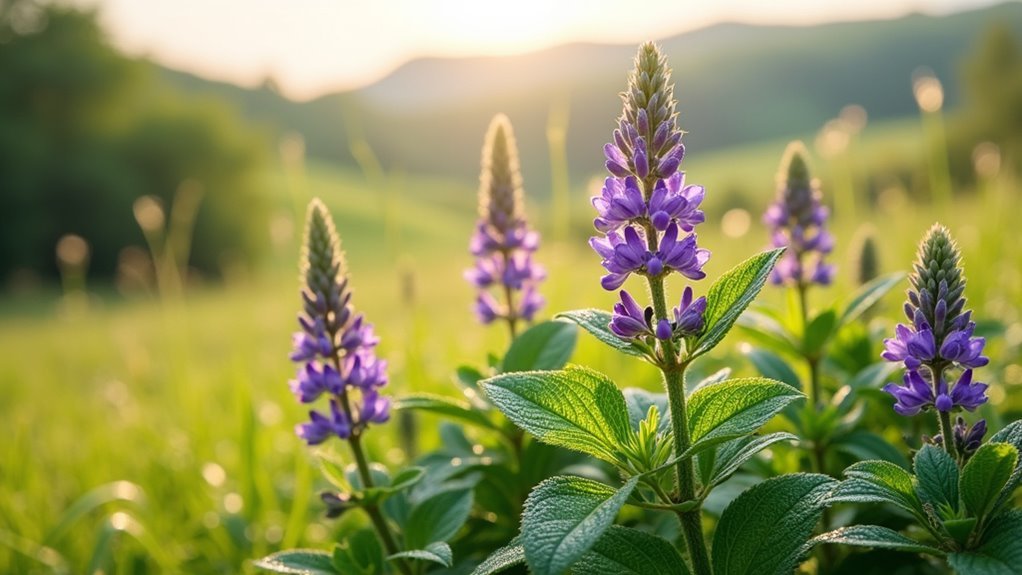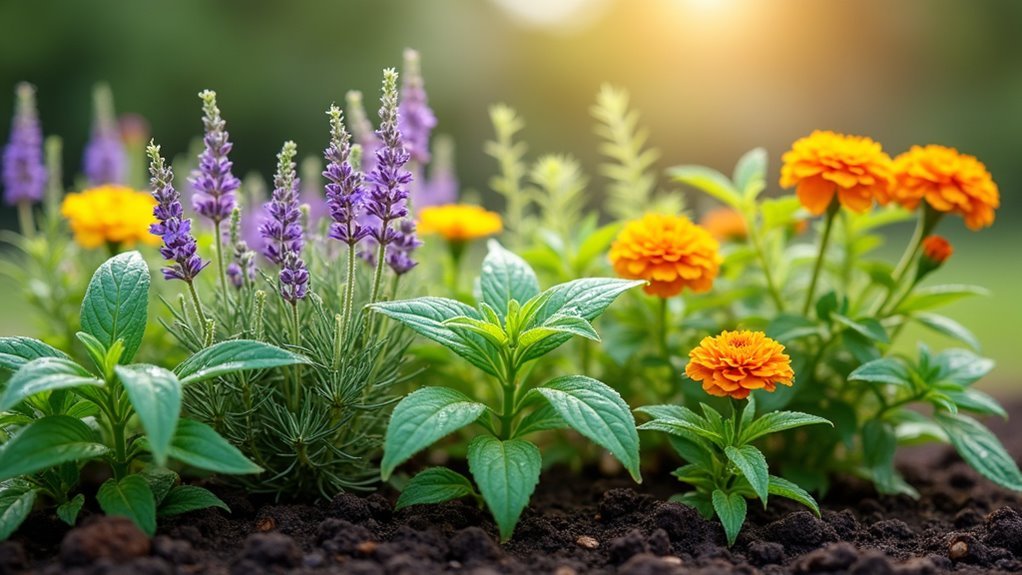You can protect your outdoor space from mosquitoes by planting aromatic herbs and flowers that naturally repel these pests. Lavender, marigolds, and citronella grass create effective barriers with their strong scents, while catmint proves ten times more effective than DEET. Rosemary, basil, and mint offer dual benefits as culinary herbs and pest deterrents. Scented geraniums, bee balm, and alliums add visual appeal while keeping mosquitoes away. These strategic plantings will transform your landscape into a naturally protected haven.
Lavender: A Fragrant Fortress Against Flying Pests

When mosquitoes threaten to turn your peaceful evenings outdoors into a battle against buzzing pests, lavender stands as your aromatic ally. This mosquito repelling powerhouse works by overwhelming insects’ sensitive smell receptors with its potent essential oils, effectively masking your scent from hungry mosquitoes.
Lavender thrives in USDA zones 5-11, demanding nothing more than full sun and well-drained soil. Once you’ve planted this drought-resistant perennial, it’ll flourish with minimal care, making it perfect for busy homeowners seeking low-maintenance solutions.
Plant lavender once in full sun with good drainage, then enjoy years of effortless mosquito protection with minimal maintenance required.
Beyond mosquito repelling capabilities, lavender deters various flying pests while creating a serene garden atmosphere.
You’ll enjoy dual benefits: natural pest control and a calming fragrance that transforms your outdoor space into a tranquil retreat where you can relax without constant swatting.
Marigolds: Colorful Annual Defenders for Patios and Gardens
While lavender offers subtle elegance in your pest-fighting arsenal, marigolds bring bold, cheerful colors that pack an equally powerful punch against mosquitoes.
These vibrant plants that repel mosquitoes deliver beautiful blooms from late spring through frost, creating continuous protection for your outdoor spaces.
You’ll appreciate how marigolds defend against multiple pests beyond mosquitoes, including aphids, thrips, and whiteflies.
Place them strategically near entrances and seating areas for maximum effectiveness.
These hardy annuals thrive in full sun and well-drained soil, making them perfect for containers or garden beds.
Consider planting marigolds as borders in your vegetable garden—they’ll boost pest resistance while supporting a healthier ecosystem.
Their easy-care nature and season-long blooming guarantee your patio stays colorful and protected.
Citronella Grass: The Natural Source of Commercial Repellents

You’ll recognize citronella grass as the source of those essential oils found in countless commercial mosquito repellents, but growing the actual plant offers superior protection through its continuous scent release.
This low-maintenance tropical grass thrives in sunny spots and can’t survive frost, making it perfect for containers you can move indoors during colder months.
While citronella oil products provide temporary relief, the living plant creates a natural barrier that’s more effective and adds lush greenery to your outdoor spaces.
Essential Oil Properties
Although many commercial mosquito repellents rely on synthetic chemicals, citronella grass provides a natural foundation for effective pest control through its potent essential oils.
These volatile compounds create the plant’s characteristic lemony scent that effectively masks human odors mosquitoes use to locate their targets.
You’ll find these essential oils work most effectively when:
- Fresh leaves are crushed or disturbed – This releases concentrated volatile oils directly into the surrounding air.
- Plants are positioned in high-activity areas – Strategic placement maximizes the oils’ mosquito repellent coverage.
- Oils are extracted for homemade solutions – You can create natural alternatives to chemical-based products.
The essential oils’ effectiveness stems from their ability to interfere with mosquitoes’ sensory detection, making you less visible to these persistent pests.
Planting and Care
Growing your own citronella grass puts this powerful mosquito deterrent directly in your hands while ensuring a steady supply of fresh, potent leaves.
Plant these perennial plants in sunny locations with well-drained soil for ideal growth in zones 9-11. In cooler climates, grow citronella as an annual since it can’t survive frost.
Choose foundation plantings or large planters for best results with this low-maintenance grass.
Harvest leaves regularly to promote healthy growth and keep mosquitoes at bay more effectively. When you crush or disturb the foliage, you’ll release stronger essential oils that enhance the plant’s natural repelling properties.
The fresh leaves you harvest can create homemade repellents, giving you multiple ways to utilize this versatile mosquito-fighting plant throughout the growing season.
Effectiveness Vs Alternatives
While citronella candles and sprays offer convenience, living citronella grass delivers superior mosquito-repelling power that synthetic alternatives can’t match.
When you choose fresh citronella grass over processed products, you’re getting continuous protection that doesn’t lose potency over time.
Here’s how citronella grass outperforms common alternatives:
- Living plants vs. candles/sprays – Fresh citronella grass maintains consistent oil production, while manufactured products weaken with age and storage.
- Natural vs. synthetic repellents – Citronella oil reduces mosquito attraction by up to 50%, offering powerful protection without DEET’s harsh chemicals.
- Permanent vs. temporary solutions – Once established, your citronella grass provides years of drought-resistant, low-maintenance mosquito control.
You’ll experience stronger, longer-lasting results with living citronella grass than any store-bought alternative.
Catmint: Ten Times More Effective Than DEET

When you’re searching for a powerful natural mosquito repellent, catmint (Nepeta) stands out as an exceptional choice that outperforms even commercial chemical repellents. This hardy perennial contains nepetalactone, making it ten times more effective than DEET at keeping pests away.
You’ll love how catmint thrives in zones 3-8, blooming from early summer through fall while adding beauty to your landscape. It’s incredibly easy to care for and spreads vigorously, creating robust mosquito-repelling barriers when planted in clusters.
The plant’s fragrant oils release when you crush the leaves, enhancing its repelling power. Beyond mosquito control, catmint attracts beneficial pollinators like bees and butterflies, promoting biodiversity in your garden while protecting your outdoor spaces.
Rosemary: Dual-Purpose Herb for Cooking and Pest Control
You’ll discover that rosemary’s strong, earthy aroma naturally repels mosquitoes while doubling as a flavorful culinary herb for your kitchen.
This versatile perennial thrives in hot, dry conditions and can be grown in containers, making it perfect for sunny garden spots or patio gardens.
Beyond its pest-controlling abilities, you can prune rosemary into decorative shapes and harvest it regularly for cooking, creating a beautiful and functional addition to your outdoor space.
Natural Mosquito Repellent Properties
As one of the most versatile herbs in your garden, rosemary delivers a powerful combination of culinary excellence and natural pest control that makes it an invaluable addition to any outdoor space.
The herb’s earthy aroma naturally deters mosquito populations while repelling other pests like cabbage moths and carrot flies.
You’ll find rosemary’s mosquito-fighting capabilities work through multiple methods:
- Living barrier – Plant it around seating areas where its natural scent creates a protective zone
- Burning deterrent – Toss fresh sprigs on your fire pit to release concentrated aromatic compounds
- Homemade solutions – Dry the leaves to create effective bug sprays for additional protection
Thriving in hot, dry conditions with full sun exposure, rosemary flourishes in zones 7-10, requiring minimal maintenance while maximizing pest control benefits.
Culinary Uses and Benefits
Beyond its impressive pest-fighting abilities, rosemary transforms your kitchen with its distinctive pine-like flavor that elevates everything from roasted potatoes to grilled lamb.
This Mediterranean herb’s earthy taste makes it essential for meat and vegetable recipes, while its dual nature as a mosquito repellent adds practical value to your garden.
You’ll find rosemary’s culinary uses extend far beyond seasoning. When you’re cooking outdoors, burning fresh sprigs creates aromatic smoke that naturally deters mosquitoes while infusing food with flavor.
You can also dry the herb to make homemade bug sprays, maximizing its pest-control benefits.
Since rosemary thrives in full sun and well-draining soil, you’ll easily incorporate this versatile perennial into your culinary garden for year-round cooking enhancement.
Growing and Care Tips
Growing rosemary successfully requires understanding its Mediterranean origins and preference for hot, dry conditions. You’ll want to provide full sun exposure and guarantee well-draining soil to prevent root rot. This hardy herb thrives in USDA zones 7-10, making it suitable for most warmer climates.
For ideal growth, follow these essential care practices:
- Plant in containers or garden beds with excellent drainage to mimic its natural habitat.
- Prune regularly to encourage bushier growth and maintain decorative shapes.
- Water sparingly once established, as rosemary prefers drought-like conditions.
Your scented rosemary plants will reward you with aromatic foliage that deters mosquitoes, cabbage moths, and carrot flies.
These beautiful plants require minimal maintenance while providing dual benefits as both pest control and culinary enhancement for your landscape.
Basil: Aromatic Leaves That Keep Mosquitoes at Bay
When you’re looking for a natural way to keep mosquitoes away from your outdoor spaces, basil stands out as one of the most effective and versatile options available. This aromatic herb’s pungent smell naturally repels mosquitoes, flies, and other unwanted pests while adding culinary value to your landscape.
| Basil Variety | Growing Zones | Container Friendly | Pest Deterrent | Culinary Use |
|---|---|---|---|---|
| Sweet Basil | 10-11 (annual) | Yes | Mosquitoes/Flies | Italian dishes |
| Thai Basil | 10-11 (annual) | Yes | Mosquitoes/Flies | Asian cuisine |
| Holy Basil | 10-11 (annual) | Yes | Mosquitoes/Flies | Teas/remedies |
| Lemon Basil | 10-11 (annual) | Yes | Mosquitoes/Flies | Seafood/salads |
| Purple Basil | 10-11 (annual) | Yes | Mosquitoes/Flies | Garnish/vinegars |
You’ll find basil thrives in damp, well-draining soil and blooms from summer until frost.
Scented Geraniums: Fast-Growing Lemon-Scented Protection
If you’re seeking a fast-growing solution that combines beautiful blooms with powerful mosquito protection, scented geraniums deliver exceptional results through their natural citronella oil content.
These versatile plants thrive in warm, sunny conditions while providing continuous fragrant defense against mosquitoes.
These hardy plants flourish in bright sunlight while delivering ongoing aromatic protection against unwanted mosquitoes in your outdoor spaces.
Lemon scented varieties offer particularly strong repelling properties that make them ideal for patios and gardens.
You’ll appreciate their adaptability since they grow successfully in containers, giving you placement flexibility around outdoor living spaces.
Here’s what makes scented geraniums excellent mosquito deterrents:
- Long blooming season – Beautiful flowers from spring through fall
- Container-friendly growth – Easy maintenance and strategic positioning
- Enhanced effectiveness – Regular pruning strengthens their mosquito-repelling power
Their vibrant colors and citrusy fragrance create an attractive landscape feature that doubles as natural pest control throughout the growing season.
Bee Balm: Attracting Beneficials While Deterring Pests
You’ll find Bee Balm offers the perfect balance of pest control and pollinator support in your garden.
This fragrant perennial releases natural oils that repel mosquitoes when its leaves are crushed, while simultaneously attracting beneficial insects like bees, butterflies, and hummingbirds.
You’re fundamentally creating a dual-purpose plant that enhances biodiversity while keeping unwanted pests at bay.
Dual-Purpose Garden Benefits
While most mosquito-repelling plants serve a single purpose, Bee Balm (Monarda) stands out as a garden powerhouse that simultaneously deters pests and attracts beneficial insects.
This dual-purpose plant creates a balanced ecosystem where you’ll enjoy fewer mosquitoes while supporting pollinators essential for garden health.
Your bee balm investment delivers multiple returns through:
- Natural pest control – Fragrant oils released from crushed leaves repel mosquitoes while providing pleasant aromatherapy for human visitors.
- Pollinator sanctuary – Vibrant blooms in red, pink, lavender, white, and purple attract bees, hummingbirds, and butterflies from mid to late summer.
- Low-maintenance perennial growth – Thrives in zones 4-8 with minimal care, ensuring years of continuous benefits.
This dual-purpose approach maximizes your garden’s functionality while enhancing biodiversity and visual appeal.
Natural Mosquito Repellent Properties
Understanding how bee balm achieves its remarkable dual function requires examining the plant’s natural chemical defenses. This mosquito-repelling perennial herb produces potent essential oils within its foliage that create an invisible barrier against unwanted insects.
When you brush against or crush the leaves, these fragrant compounds are released into the air, effectively deterring mosquitoes and other pests from the surrounding area.
The same oils that repel harmful insects work differently on beneficial species. Bees and butterflies are actually attracted to these aromatic compounds, finding them irresistible rather than offensive.
You can harness these natural properties by creating homemade insect repellents from the plant’s oils, providing a chemical-free alternative to commercial products while maintaining your garden’s ecological balance.
Pollinator Attraction Features
Beyond its pest-deterring capabilities, bee balm transforms into a pollinator magnet through its distinctive tubular flowers that bloom in brilliant shades of red, pink, purple, and white.
This perennial powerhouse creates a dual-purpose garden solution that’ll enhance your landscape’s biodiversity while keeping mosquitoes at bay.
Here’s how bee balm serves as one of the best plants to help with pollinator attraction:
- Hummingbird Haven – The tubular flower structure perfectly accommodates hummingbird beaks, providing essential nectar during mid to late summer blooming periods.
- Butterfly Buffet – Vibrant flower clusters offer landing platforms and rich nectar sources that butterflies can’t resist.
- Bee Bonanza – Native bees and honeybees flock to the abundant pollen and nectar, supporting crucial pollination networks.
You’ll create an ecosystem sanctuary that works double duty in your garden.
Mint: Non-Toxic Multi-Pest Repellent for Family Gardens
Mint stands out as one of nature’s most versatile defenders against garden pests, offering families a completely safe way to repel mosquitoes, flies, and ants without exposing children or pets to harmful chemicals. This mint herb is easy to grow and thrives in damp, well-draining soil across zones 3-8.
| Feature | Benefit |
|---|---|
| Indoor Use | Dried leaves provide natural pest control |
| Culinary Value | Fresh leaves for teas and cooking |
| Growing Options | Containers or direct garden planting |
| Maintenance | Regular pruning prevents invasive spread |
You’ll appreciate mint’s dual purpose – while its strong aroma effectively deters unwanted insects, you can harvest fresh leaves for culinary enjoyment. Plant it in pots to control spread, or prune regularly when grown directly in garden beds.
Allium: Globe-Shaped Flowers With Powerful Mosquito-Fighting Fragrance
The remarkable allium family transforms your garden into a natural mosquito defense system while delivering stunning visual appeal through their distinctive globe-shaped blooms.
These perennial powerhouses, including garlic and onions, release potent fragrances that keep away mosquitoes and other unwanted pests effectively.
Allium’s triple benefits make them garden superstars:
- Pest control – Strong scent naturally repels mosquitoes while enhancing your garden’s overall aroma
- Visual impact – Whimsical globe-shaped flowers on slender stems create unique focal points
- Pollinator support – Attractive blooms benefit beneficial insects, promoting garden biodiversity
Thriving in USDA zones 3-8, allium plants bloom from planting until hard frost.
You’ll enjoy their mosquito-fighting properties while creating a more pleasant outdoor environment that’s both functional and beautiful.
Frequently Asked Questions
What Is the Best Outdoor Plant to Keep Mosquitoes Away?
You’ll find catmint’s your best choice since it’s ten times more effective than DEET at repelling mosquitoes. It’s also hardy, thriving in zones 3-8, making it versatile for most climates.
What Keeps Mosquitoes Away in Landscaping?
You’ll keep mosquitoes away by planting lavender, marigolds, and citronella grass near seating areas, removing standing water sources, ensuring proper drainage, and using companion planting with basil and rosemary throughout your landscape.
How Do I Make My Yard Mosquito Free?
You’ll need to eliminate standing water from containers, gutters, and birdbaths while planting mosquito-repelling varieties like lavender, citronella, and catmint throughout your yard’s seating areas.
Do Coffee Grounds Keep Mosquitoes Away?
Coffee grounds can help repel mosquitoes by masking scents that attract them and creating barriers around plants. The caffeine’s also toxic to mosquito larvae, but you’ll need additional control methods for best results.
In Summary
You’ll create a natural barrier against mosquitoes by strategically placing these plants around your outdoor spaces. Don’t rely on just one variety—combine several for maximum effectiveness. Plant them near seating areas, walkways, and entry points where you’ll benefit most from their repellent properties. Remember that crushing leaves releases stronger oils, so position these plants where you’ll brush against them naturally. You’ll enjoy beautiful landscaping that’s both functional and pest-free.





Leave a Reply